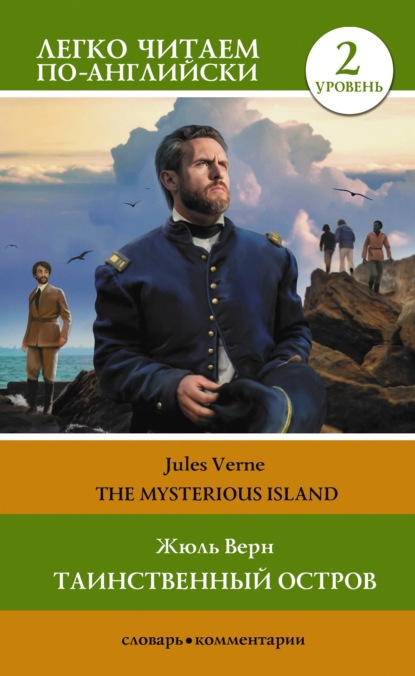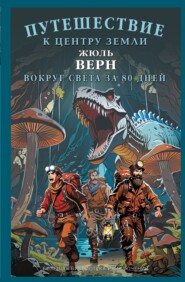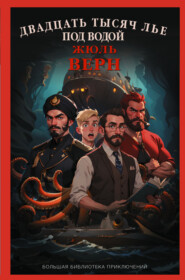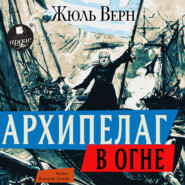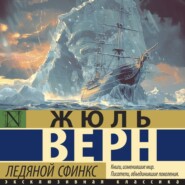По всем вопросам обращайтесь на: info@litportal.ru
(©) 2003-2024.
✖
Таинственный остров / The Mysterious Island. Уровень 2
Настройки чтения
Размер шрифта
Высота строк
Поля
– Mr. Smith, do you want to escape?
– How? – answered the engineer, quickly. – Who are you?
Pencroff told him about himself.
– Well, – replied Smith. – And how will you escape?
– By this balloon!
The sailor explained his project, which was very simple. The storm was terrible, it is true; but a skillful engineer, Smith, knew how to manage a balloon. He saw many storms in his life.
Cyrus Smith listened to the sailor and stayed silent. This was the opportunity! The project was very dangerous, but it was real. During the night, they will reach the balloon, and creep into the basket!
– I am not alone, – said Smith.
– How many people more? – demanded the sailor.
– Two; my friend Spilett, and my man Neb.
– Three, – replied Pencroff; – and, with Herbert and myself, five. Can the balloon carry us?
– Yes. We will go! – said the engineer.
– Tonight, at ten o’clock, – replied Smith.
Evening arrived. Fog passed over the earth. The weather was cold. The streets of the city were empty. No one cared to guard the balloon in a weather like this.
At half past 9, Cyrus Smith and his companions came together at the basket. Four of them took their places in the basket, while Pencroff unfastened the bundles of ballast. Then the sailor joined his companions. At that moment, a dog leaped into the basket. It was Top, the dog of the engineer.
Then the storm burst upon them. It was not until five days later that they saw the sea below them.
So of these five men, four found themselves[13 - found themselves – оказались], four days later, on a desert coast. And their leader, Cyrus Smith, disappeared.
Chapter III
The engineer’s dog disappeared, too. The faithful animal tried to rescue its master.
It was nearly 6 o’clock. The night was very dark. The men went northward along the shore. Where are they? They walked upon a sandy soil. They were searching all the corners.
After a walk of twenty minutes, the four men were suddenly stopped by a precipice. They saw a sharp point upon which the sea broke.
– We must turn back, – said the sailor.
They cried, but without response. They waited, and tried once more. And again there was no answer. Then they turned back. However, Pencroff observed that the shore was bold there, and the birds were less numerous on this shore. They were walking towards the south. Soon they were on the shore again.
– We are on an island, – exclaimed Pencroff.
The words of the sailor were true. The castaways were upon an island not more than two miles long. It was necessary to wait until the next day to search for the engineer.
Then they searched for wood or dry branches. Sand and stones were all they found. One can understand the grief of Neb and his companions, who loved their brave comrade. The engineer escaped. Did he die? The hours were long and dreadful, the cold was intense. But the castaways did not sleep. They moved back and forth upon that arid island. They listened, they shouted, they tried to find their friend.
Once they heard an echo; and Herbert said:
– There is land to the west.
The sailor nodded. The land must be there!
The night passed. At 5 o’clock in the morning the heavens began to brighten, though the horizon remained obscure. The fog soon rose. At half past 6, the sky was clear. Then the sea appeared. Yes, the land was there! The island and the main land were separated by a channel half a mile wide. Into this current Neb jumped. Pencroff called to him. The reporter prepared to follow, but the sailor ran to him, and exclaimed:
– Do you want to cross this channel?
– Yes, I do, – replied Spilett.
– Well, listen to me. Neb can rescue his master without us. But if we throw ourselves into the channel, this strong current will carry us away. Wait, just wait a little.
Meantime, Neb was swimming against the current. Finally, he crossed the half mile which separated the isle from the mainland.
Neb landed at the base of a high rocky wall, and clambered its side, and then disappeared behind a rock. Neb’s companions ate shellfish, which they found upon the sands. It was a poor meal, but they didn’t have anything else.
The opposite coast formed an immense bay. Towards the north, the bay widened, with a shore more rounded. It was extending from the southwest to the northeast, and ended in a narrow cape. Between these two points, the distance was about eight miles. Half a mile from the shore the island lay upon the sea. Its width was about a quarter of a mile. Before the Island, the shore began with a beach with black rocks. Beyond this rose a perpendicular granite wall, at least 300 feet high and terminated by a ragged edge. This extended for about three miles.
Upon the upper level of the coast nothing was visible. Finally, distant towards the northwest about seven miles, shone a white summit. It was the snowy cap of a mountain.
Was this land an island or a part of a continent? Gideon Spilett, Pencroff, and Herbert looked upon the land.
– Well, – demanded Herbert, – what do you think of it, Pencroff?
– We will soon see, – replied the sailor, – In three hours we can reach that shore, and we will see what we can do to find Mr. Smith.
Pencroff was right. Three hours later, at low tide, Spilett and his two companions waded through the water. Herbert swam like a fish; and all arrived without difficulty at the other shore.
Chapter IV
The reporter walked further along the coast. Herbert wanted to go with him.
– Stay, my boy, – said the sailor. – We must pitch our camp for the night, and try to find something to eat. Our friends will need food when they come back. We are tired, cold, and hungry. We need shelter, fire, and food. We will find wood in the forest, and we can get eggs from the nests. And we must find a house.
– We can look for a cave in these rocks, – said Herbert.
They walked along the base of the rocky wall. Then they turned to the south. Pencroff noticed a narrow inlet in the coast. Now it was important to pitch the camp near the water.
The rock rose 300 feet, smooth and massive. It was a sturdy wall of the hardest granite. About the summit hovered a host of aquatic birds, with long, narrow, pointed beaks.
Herbert noticed some rocks. On them lay hosts of bivalves.
– They are lithodomes[14 - lithodomes – литодомы], – said Herbert.
– Can we eat them? – said Pencroff.
– How? – answered the engineer, quickly. – Who are you?
Pencroff told him about himself.
– Well, – replied Smith. – And how will you escape?
– By this balloon!
The sailor explained his project, which was very simple. The storm was terrible, it is true; but a skillful engineer, Smith, knew how to manage a balloon. He saw many storms in his life.
Cyrus Smith listened to the sailor and stayed silent. This was the opportunity! The project was very dangerous, but it was real. During the night, they will reach the balloon, and creep into the basket!
– I am not alone, – said Smith.
– How many people more? – demanded the sailor.
– Two; my friend Spilett, and my man Neb.
– Three, – replied Pencroff; – and, with Herbert and myself, five. Can the balloon carry us?
– Yes. We will go! – said the engineer.
– Tonight, at ten o’clock, – replied Smith.
Evening arrived. Fog passed over the earth. The weather was cold. The streets of the city were empty. No one cared to guard the balloon in a weather like this.
At half past 9, Cyrus Smith and his companions came together at the basket. Four of them took their places in the basket, while Pencroff unfastened the bundles of ballast. Then the sailor joined his companions. At that moment, a dog leaped into the basket. It was Top, the dog of the engineer.
Then the storm burst upon them. It was not until five days later that they saw the sea below them.
So of these five men, four found themselves[13 - found themselves – оказались], four days later, on a desert coast. And their leader, Cyrus Smith, disappeared.
Chapter III
The engineer’s dog disappeared, too. The faithful animal tried to rescue its master.
It was nearly 6 o’clock. The night was very dark. The men went northward along the shore. Where are they? They walked upon a sandy soil. They were searching all the corners.
After a walk of twenty minutes, the four men were suddenly stopped by a precipice. They saw a sharp point upon which the sea broke.
– We must turn back, – said the sailor.
They cried, but without response. They waited, and tried once more. And again there was no answer. Then they turned back. However, Pencroff observed that the shore was bold there, and the birds were less numerous on this shore. They were walking towards the south. Soon they were on the shore again.
– We are on an island, – exclaimed Pencroff.
The words of the sailor were true. The castaways were upon an island not more than two miles long. It was necessary to wait until the next day to search for the engineer.
Then they searched for wood or dry branches. Sand and stones were all they found. One can understand the grief of Neb and his companions, who loved their brave comrade. The engineer escaped. Did he die? The hours were long and dreadful, the cold was intense. But the castaways did not sleep. They moved back and forth upon that arid island. They listened, they shouted, they tried to find their friend.
Once they heard an echo; and Herbert said:
– There is land to the west.
The sailor nodded. The land must be there!
The night passed. At 5 o’clock in the morning the heavens began to brighten, though the horizon remained obscure. The fog soon rose. At half past 6, the sky was clear. Then the sea appeared. Yes, the land was there! The island and the main land were separated by a channel half a mile wide. Into this current Neb jumped. Pencroff called to him. The reporter prepared to follow, but the sailor ran to him, and exclaimed:
– Do you want to cross this channel?
– Yes, I do, – replied Spilett.
– Well, listen to me. Neb can rescue his master without us. But if we throw ourselves into the channel, this strong current will carry us away. Wait, just wait a little.
Meantime, Neb was swimming against the current. Finally, he crossed the half mile which separated the isle from the mainland.
Neb landed at the base of a high rocky wall, and clambered its side, and then disappeared behind a rock. Neb’s companions ate shellfish, which they found upon the sands. It was a poor meal, but they didn’t have anything else.
The opposite coast formed an immense bay. Towards the north, the bay widened, with a shore more rounded. It was extending from the southwest to the northeast, and ended in a narrow cape. Between these two points, the distance was about eight miles. Half a mile from the shore the island lay upon the sea. Its width was about a quarter of a mile. Before the Island, the shore began with a beach with black rocks. Beyond this rose a perpendicular granite wall, at least 300 feet high and terminated by a ragged edge. This extended for about three miles.
Upon the upper level of the coast nothing was visible. Finally, distant towards the northwest about seven miles, shone a white summit. It was the snowy cap of a mountain.
Was this land an island or a part of a continent? Gideon Spilett, Pencroff, and Herbert looked upon the land.
– Well, – demanded Herbert, – what do you think of it, Pencroff?
– We will soon see, – replied the sailor, – In three hours we can reach that shore, and we will see what we can do to find Mr. Smith.
Pencroff was right. Three hours later, at low tide, Spilett and his two companions waded through the water. Herbert swam like a fish; and all arrived without difficulty at the other shore.
Chapter IV
The reporter walked further along the coast. Herbert wanted to go with him.
– Stay, my boy, – said the sailor. – We must pitch our camp for the night, and try to find something to eat. Our friends will need food when they come back. We are tired, cold, and hungry. We need shelter, fire, and food. We will find wood in the forest, and we can get eggs from the nests. And we must find a house.
– We can look for a cave in these rocks, – said Herbert.
They walked along the base of the rocky wall. Then they turned to the south. Pencroff noticed a narrow inlet in the coast. Now it was important to pitch the camp near the water.
The rock rose 300 feet, smooth and massive. It was a sturdy wall of the hardest granite. About the summit hovered a host of aquatic birds, with long, narrow, pointed beaks.
Herbert noticed some rocks. On them lay hosts of bivalves.
– They are lithodomes[14 - lithodomes – литодомы], – said Herbert.
– Can we eat them? – said Pencroff.





